Spider Bites Piercing: Procedure, Cost, And Aftercare
Turn heads with a fierce and edgy lip piercing adorned with some beautiful bling.

Image: Image Credit: StyleCraze Design Team
If you want to add an edgy touch to your punkish look, say no more! Spider bite piercings are a trendy form of body modification involving the insertion of jewelry in specific locations on the lower lip. These adult piercings typically come in pairs, creating a symmetrical appearance reminiscent of a spider’s fangs. They are often chosen for their aesthetic appeal and the ability to enhance facial features. The procedure involves puncturing the skin to insert the jewelry, resulting in a distinctive look that can be personalized with various types of studs, rings, or curved barbells. Spider bite piercings have gained popularity amongst experienced body piercing enthusiasts seeking unique ways to express their style and individuality. So, if these piercings have piqued your interest, then scroll down to learn everything about them, from the procedure and cost to the potential risks, aftercare tips, and everything in between. Keep reading!
 Piercing Guide: Spider Bites
Piercing Guide: Spider Bites- Placement: On either side of the lower lip
- Best Jewelry: Rings, studs, or barbells
- Cost: $40 to $100
- Pain Level: Medium
- Healing Time: 6 to 10 weeks
In This Article
What Is A Spider Bites Piercing?
A spider bite piercing involves getting pierced on two adjacent spots just under or on your lower lip, creating the appearance of fang marks from a spider bite. This pair of piercings are usually positioned closely together on one side of the lower lip, giving you a subtle yet edgy look. This type of lip piercing allows you to flaunt various jewelry options like studs or rings, adding a unique touch to your appearance.
Choosing a professional and experienced piercer is important for this type of piercing to ensure proper placement and minimize any possible risks. Remember to consider your personal style preferences and suitability before getting this type of lip piercing.
 Did You Know?
Did You Know?Spider bite piercings are cool and eye-catching, giving the perfect symmetrical impression. But is its procedure different from other body piercings since it is done on one side of your lower lip? Find out below!
Key Takeaways
- Spider bites piercings look exactly like a real spider bite with two piercing marks on one side, right below your lip.
- Spider bite piercings can cause moderate discomfort during the procedure, but pain tolerance varies among individuals.
- The piercing process involves marking the spots on your lower lip and using a hollow needle to create the piercings.
- Opt for hypoallergenic materials and quality jewelry to minimize the risk of allergic reactions and ensure durability.
Spider Bites Piercing Procedure
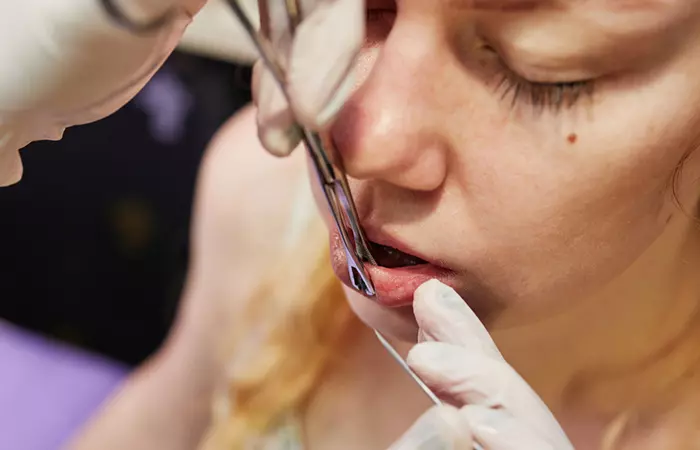
When it comes to spider bite piercings, it is very important to a skilled piercer who does these specific piercings often. Look for a piercer or reputable piercing studio that follows the best hygienic and safety practices, as this minimizes the risk of infections. Once you have picked your piercer or studio, meet them for a consultation where you can ask them all the questions on your mind.
The day of the procedure, the piercer will clean and sterilize the tools they are working with. During a spider bite piercing procedure, they will clean and mark two spots on one side of your lower lip where the piercings will go. Then they use a hollow needle to create two piercings, swiftly inserting pre-picked jewelry, such as circular barbells or metal studs, into each hole. You may feel a quick pinch or pressure during the process.
Afterward, your skilled piercer will provide instructions for cleaning and caring for your new facial piercings to promote proper healing. Remember to follow these instructions closely to minimize the risk of infection and ensure the best outcome for your advanced piercings. You may feel some discomfort for the first few days because of the healing process and you need time to get used to your new piercings. However, if you experience any unusual pain, swelling, or signs of infection for more than 2-3 weeks, do not hesitate to contact an experienced piercer or a healthcare professional for guidance.
The procedure is simple enough and generally causes very little discomfort. However, if you are planning to get this form of lip piercing, you must have prepared a budget as piercings can be expensive. The best way to go about this is to research the prices to avoid problems.
How Much Does A Spider Bites Piercing Cost?
View this post on Instagram
The cost of a spider bite piercing differs depending on factors like the piercing studio’s location, the expertise of the piercer, and the quality of the jewelry you choose. On average, you can expect to pay between $40 to $100 for each piercing. This estimate does not include the cost of aftercare products or potential touch-up appointments. Higher-end studios for body piercing or exclusive piercers with more experience may charge more for their services and also ask for an acceptable, non-expired ID or consent from a legal parent or guardian. It is essential to research different body piercing studios in your area, read reviews, and inquire about their pricing and sanitizing process to find a reputable place that fits your budget and meets your expectations.
These facial piercings are generally more affordable than other types, as lip piercings tend to be the most common of all piercings. In the UK, while simple piercings are typically priced similarly, dermal, genital, and surface piercings tend to be priced higher due to their complexity. But what about the pain? Does it hurt a lot?
How Painful Are Spider Bites Piercings?
Spider-bite piercings can be moderately painful for people with sensitive skin. The sensation varies from person to person, depending on your pain tolerance, the piercer’s skill, and the piercing location. You may feel a quick pinch or pressure as the needle passes through the skin, followed by some discomfort or soreness afterward. Since the piercings are done nearer the thicker part of the lower lip and lower jaw bone, it may be painful. Some people describe the pain as similar to a sharp pinch or a stinging sensation. However, the pain is typically manageable and short-lived. Afterward, you may experience some soreness or tenderness in the pierced area that usually subsides within a few days as the piercing begins to heal.
Chelsea, a blogger, shares her experience of getting a spider bite piercing. She writes, “This one hurt more than my first lip piercing, I guess because it was nearer to the center where it’s thicker but it still wasn’t too bad (i).”
Taking deep breaths and staying relaxed during the procedure can help alleviate discomfort. The next big question that you must have is what kind of jewelry is good for this kind of piercing?
How To Select The Right Jewelry For Your Spider Bites Piercing
View this post on Instagram
Choosing the perfect types of jewelry for your spider bite piercing is crucial for both comfort and style. With various popular options available, it is essential to consider factors like size, material, and design to ensure your piercing looks great and feels comfortable. Look at the lip jewelry options below suitable for your spider bite piercings.
- Studs: Flat-backed labret studs or tiny ball studs make for a subtle and comfortable option suitable for fresh lip piercings.
- Rings: Piercing hoops or captive bead rings add a touch of edge to your spider bite piercings, offering versatility in style and size. However, they are less recommended during the healing process.
- Gemstones: Add a pop of color or sparkle with gemstone accents on your jewelry, such as tiny CZ studs or gemstone-embedded rings.
- Threadless Jewelry: Threadless jewelry with interchangeable tops allows for easy customization and style changes without removing the entire piece, providing convenience and versatility.
- Flat Backs: Flat-backed jewelry, like labret studs, is comfortable for mouth piercings like spider bites, reducing irritation and minimizing interference with daily activities like eating and talking.
When we consider the safest jewelry materials, it is best to opt for hypoallergenic materials like surgical-grade stainless steel, titanium, or solid gold to minimize the risk of irritation or allergic reactions (1). Avoid materials known to cause allergic reactions, such as nickel.
Opting for a piece of jewelry that helps in the healing of your piercing is the best as some piercings take more time to heal than others. So, how much time does it take for spider bite piercings to heal?
How Long Does A Spider Bites Piercing Take To Heal?
A spider bite piercing typically takes around 6-10 weeks to heal, though individual healing times vary based on factors like your body’s healing ability, aftercare practices, and any complications that may arise. During this period, you may experience some swelling, tenderness, and light discharge that are normal parts of the healing process. It is important to be patient and avoid disturbing the piercing as it heals. Monitor it closely for any signs of infection or complications, such as excessive swelling, severe pain, or unusual discharge. Remember that proper healing relies on your body’s natural processes, so give your piercing the time and extra care it needs to fully recover.
Although spider bite piercings take less time to heal than other facial piercings, it is important to keep a vigilant eye on them. Like any other piercing, you may face complications or side effects, so knowing them beforehand will help you tackle it either by consulting your reputable piercer or a healthcare professional.
Potential Risks Of Spider Bites Piercings
View this post on Instagram
Before getting a spider bite piercing, it is important to be aware of the potential risks and side effects associated with this type of piercing.
- Infection: The chance of infection from mouth bacteria is higher if proper aftercare instructions are not followed, leading to symptoms like redness, swelling, tenderness, and discharge (2).
- Migration or Rejection: Your body may view the piercing as a foreign object, leading to shifting or pushing the piercing out of your body.
- Allergic Reactions: Using jewelry made from low-quality materials can cause allergic reactions, resulting in itching, redness, or swelling.
- Gum And Tooth Damage: Constant rubbing of jewelry against the teeth and gums can lead to enamel erosion, gum recession, tooth decay, or chipped teeth (3).
- Keloids or Scarring: Individuals prone to keloids or hypertrophic scarring may experience excessive scar tissue formation around the piercing wound site (4).
- Nerve Damage: Improper piercing procedure or placement can result in nerve damage, leading to numbness, tingling, or loss of sensation in the surrounding area.
- Oral Health Complications: Poorly placed piercings can interfere with functions like chewing and speaking, leading to oral infections or damage to oral structures.
Understanding these risks can help you make an informed decision and take necessary precautions to minimize any adverse outcomes. Being aware of and following basic piercing aftercare helps avoid all complications. Continue on to the next section to learn how to care for your spider bite piercing.
Spider Bites Piercing Aftercare
Proper aftercare is essential for ensuring a smooth healing process after getting spider bite piercings. If you are confused about how to clean your spider bite piercing, here is a concise guide to help you care for them effectively (5):
- Cleanse: Use a saline solution or a gentle antibacterial soap, warm water, and cotton balls to clean your spider bites twice a day to remove debris and prevent an infection.
- Hands-Off: Refrain from touching or playing with your piercing to minimize the risk of introducing bacteria and causing irritation that may lead to piercing rejection.
- Rinse: After meals, rinse your mouth with water or a mild alcohol-free mouthwash to remove smaller bits of food and maintain oral hygiene. You may also spritz some aftercare spray over it.
- No Oral Contact: Refrain from kissing and any other activities that involve direct oral contact to prevent irritation and reduce the risk of infection.
- Avoid Movement: Avoid aggressive activities that may bump or snag your piercing, as this can cause pain, swelling, or complications. Brush your teeth gently until the skin has healed completely.
- Monitor: Keep an eye on your piercing for signs of infection, such as:
– Increased redness around the piercing site
– Persistent or severe pain
– Unusual discharge, such as yellow, green, or thick pus
– Swelling - Follow-up: Attend follow-up appointments with a piercing professional as recommended to ensure proper healing and address any concerns or complications promptly.
- Soft Food: Choose soft, non-spicy foods that will not irritate your piercing to promote healing and avoid discomfort while eating.
 Pro Tip
Pro TipSpider bite piercings offer a unique and edgy aesthetic to your overall look. While they do come with the risk of infection and other complications, you can avoid them easily. Follow the correct aftercare instructions diligently, choose high-quality jewelry, and stay vigilant for any signs of complications to enjoy your spider bite piercings with minimal risk. Remember to consult a professional piercer for guidance before the piercing procedure and support throughout the healing process. While getting the piercing may hurt a bit, being patient and careful can maintain the health and integrity of your piercings, keeping them looking stylish. Ultimately, a well-cared-for spider bite piercing can be a striking and satisfying addition to your expression.
Frequently Asked Questions
How long should I wait to change my spider bite piercing jewelry?
It is recommended to wait until your piercings are healed completely before changing out the jewelry. Wait at least 4-12 weeks before changing your spider bite piercing jewelry to allow for proper healing. Prematurely changing jewelry can disrupt the healing process and increase the risk of complications.
How to take care of a spider bite piercing infection?
Clean the area with a sterile saline solution, apply a doctor-prescribed antibiotic cream, and avoid touching it. Frequently disinfect the mouth with a recommended mouthwash. Seek medical attention if the infection worsens or persists.
Do spider bite piercings leave scars?
Yes, spider bite piercings can leave scars if not properly cared for during the healing process or if complications arise during or after the piercing.
Can I get spider bite piercings if I have allergies or sensitive skin?
Yes, you can still get spider bite piercings if you have allergies or sensitive skin. However, it is crucial to choose hypoallergenic jewelry and consult with your piercer to minimize potential reactions.
There are always advantages and disadvantages of getting a piercing, and the same applies to spider bite lip piercings as well. If you wish to all there is to know about it, along with its pros and cons, then check out the video below for a happy piercing experience.
Personal Experience: Source
StyleCraze's articles are interwoven with authentic personal narratives that provide depth and resonance to our content. Below are the sources of the personal accounts referenced in this article.
(i) My piercing experiencehttps://chelseaswriting.wordpress.com/2012/07/11/my-piercing-experience/
References
Articles on StyleCraze are backed by verified information from peer-reviewed and academic research papers, reputed organizations, research institutions, and medical associations to ensure accuracy and relevance. Read our editorial policy to learn more.
- Jewelry For Initial Piercings
https://safepiercing.org/wp-content/uploads/2025/05/APP_Initial_Print.pdf - Body Piercing Infections
https://www.ncbi.nlm.nih.gov/books/NBK537336/ - Oral Piercing: A Pretty Risk—A Scoping Review Of Local And Systemic Complications Of This Current Widespread Fashion
https://www.researchgate.net/publication/370626504_Oral_Piercing_A_Pretty_Risk-A_Scoping_Review_of_Local_and_Systemic_Complications_of_This_Current_Widespread_Fashion - Body Piercing: Avoiding Complications
https://www.npjournal.org/article/S1555-4155(14)00650-3/pdf - Body Piercings: Cleaning And Healing
https://uhs.berkeley.edu/health-topics/body-piercings
Read full bio of Eve Phillips
Read full bio of Shreya Mukherjee
Read full bio of Anjali Sayee
Read full bio of Pahul Nanra






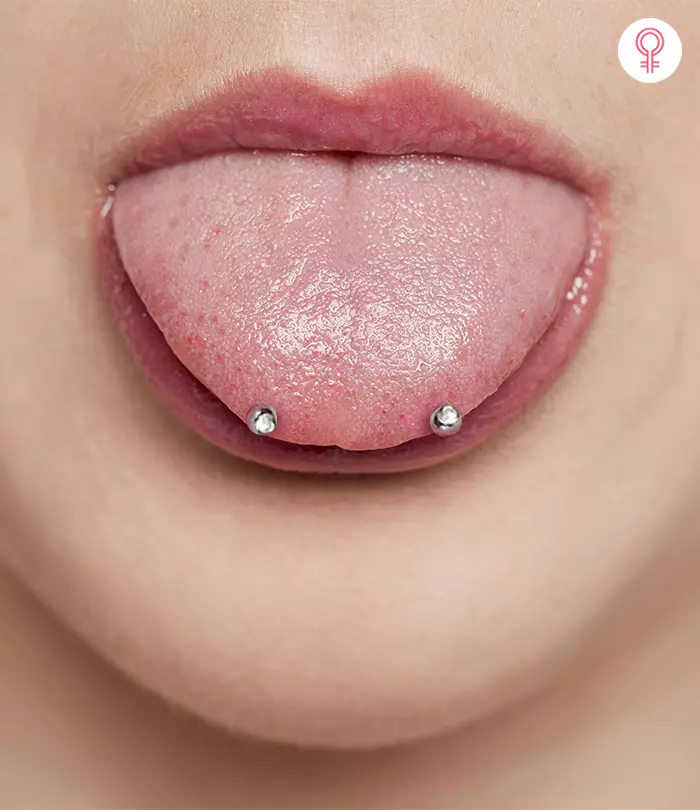


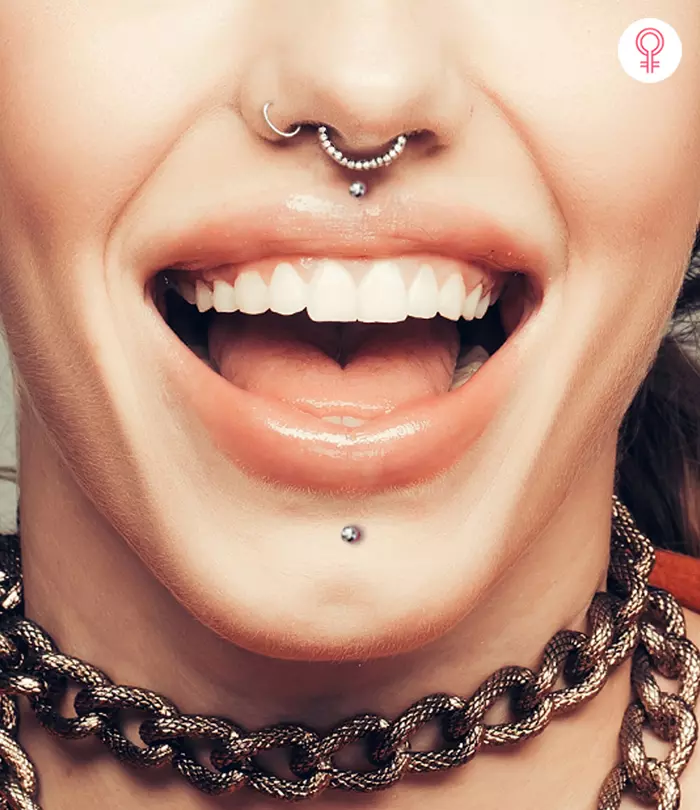











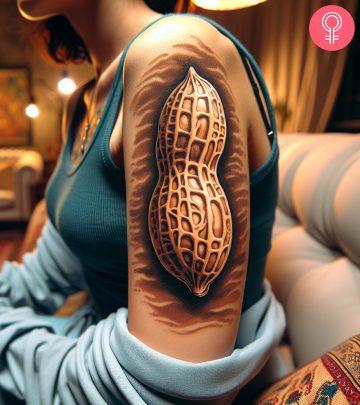


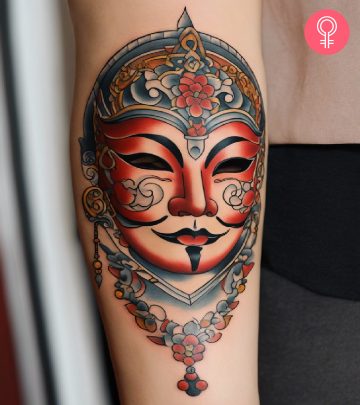


Community Experiences
Join the conversation and become a part of our empowering community! Share your stories, experiences, and insights to connect with other beauty, lifestyle, and health enthusiasts.